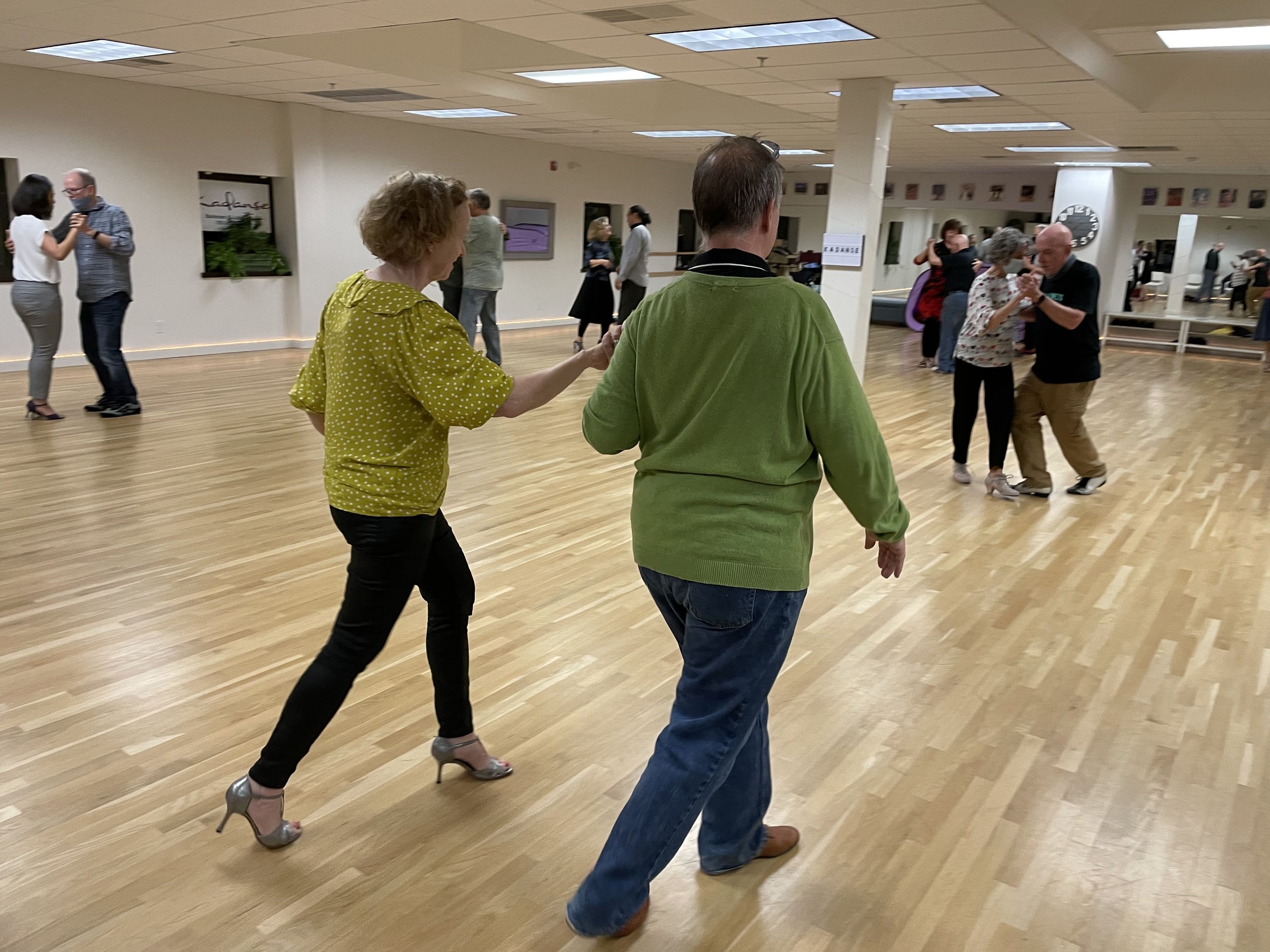Why Is It Important to Dance With Beginners? - Tango Insights
If one has been taking tango classes for quite some time now, it is perhaps not difficult to spot those at the beginner level. Most tend to have an expression of uncertainty.
They try not to catch the instructor’s attention, worried that they would be called out for a wrong step. Their movements can be awkward and stilted, and they may struggle to keep up with others who have already accelerated from the beginner course.
When it comes to taking on the leader or follower roles, beginners often switch between either role when dancing with partners of the same level.
However, this is not the case when paired with someone with a higher skill level. As followers, beginner tango students might not be able to properly perceive cues on time. They can be resistant to suggestions or fail to interpret the next move being proposed. On the other hand, they might not be able to take on the role of a leader since their repertoire of moves and steps has yet to expand.
It is not at all surprising to see that those who have had a little more experience taking tango lessons tend to avoid dancing with beginner tango students.
Dancing with them can be a challenge since they are not yet well-versed in the language of Argentine tango.
Argentine Tango Class ate Ultimate Tango
For intermediate or advanced dancers, this can lead to a less than satisfying experience, if not one of frustration, especially during milongas. In some cases, gauging dancers based on their skill level can breed some form of “classism” or elitism among dancers, with many refusing to dance with those who do not belong to their “circle.”
However, what many intermediate or advanced tango dancers don’t realize is that it is rather important to dance with beginners despite the gap in proficiency or understanding. It is because more than just a dance, Argentine tango is a unique experience.
To only dance with those within one’s supposed skill level can very well limit this experience, making tango more of a comfort zone rather than an activity that fosters discovery within oneself and other people.
Practica at Ultimate Tango
An anecdote from Brisbane House of Tango explains:
“Dance should not be about competition or elitism, i.e. only dancing with people in your ‘class’ or at your ‘level’.
Oftentimes, people will prefer only dancing with other people at their level and going to great lengths to avoid making contact with others they deem unsuitable. This is such a shame, not only for the development of the dance but for their own potential enjoyment possibilities.
“From my experience, sometimes, you will dance with an experienced dancer and it will not be enjoyable, whether that be due to lack of physical connection, an energetic disconnection, you don’t connect to the music or maybe one or both of you are simply having a bad day! On a different day, that dance with the same person to the same music may be fabulous.
“On the other hand, oftentimes, you can dance with someone who is relatively inexperienced or just beginning as a Tango dancer and yet have a wonderful experience.”
Aside from gaining different experiences, there are many other vital reasons why one should deem it important to dance with beginners. Here are others that one can take into consideration:
Every Expert Was Once a Beginner
Helen Hayes, a winner of prestigious awards such as the Emmy, Grammy, Tony, and Oscar, is often attributed for this quote:
“The expert at anything was once a beginner.”
This rings true not only in tango dancing but in every endeavor one chooses to pursue.
One must first begin with little knowledge of the field they are engaged in.
Precisely because one started as a beginner is why one can quickly identify who the beginners are, having recognized oneself in those expressions of uncertainty or awkward execution of steps.
Lest one forgets, the life of a beginner tango dancer can be rather difficult.
It is not at all unusual for many aspiring tango dancers to come into a class without knowing what to expect.
Perhaps, they mistakenly think that to dance tango is to merely mimic the steps of the instructor.
Initially, not many realize that there is so much history to the dance that they must become acquainted with to fully understand and appreciate the experience.
Practica at Ultimate Tango - Linda and Michael - 9 week Tango Old, essentially fresh from the Beginner Course, practicing their ochos.
There are also various codes and customs for tango, many of which are not written down and simply passed on verbally, especially when it comes to etiquette in milongas. This can lead to a lot of social faux pas that may even discourage beginners from attending milongas at all for fear of being reprimanded by dancers who understand these seemingly ambiguous rules.
While it is unfortunate, there are those in the tango community who may have also encountered a partner who made them feel ashamed to be a beginner.
Certainly, one must have experienced these challenges as well, which is why it's important to dance with beginners and help them out. Upon achieving some level of expertise, some may forget that without the help of a mentor or a partner of greater skill, they might not have achieved some measure of mastery in the first place.
Beginners may take time to hone, but because their desire to learn can make them receptive to feedback or positive reinforcement, they will soon be able to catch up to their more experienced peers.
A post from Align Thoughts offers this reminder:
“Everyone starts as a beginner and takes that first step, and only by moving forward can they reach that expert level.”
Instead of avoiding beginners, it is a much more fruitful and rewarding experience to help them through constant practice and guidance. This doesn't have to be done during milongas as the purpose of this social event is to simply enjoy the moment. However, one can appropriately guide beginners during classes or practicas by inviting them to dance and giving them the attention and patience they need. After all, even the most beautiful buds cannot bloom without sunshine and water.
Maritza and Russell during Tango Fundamentals class at Ultimate Tango
Reacquainting With the Basics Creates Opportunities for Growth
A post from BBC talks about how Tom Vanderbilt, American journalist and author of the book Beginners, discovered how having a “beginner’s mindset” can be beneficial to all those who wish to achieve mastery in whatever they do. The post explains:
‘‘Vanderbilt discovered that we often learn best when we know that we will have to teach others the same skill.”
“It’s not clear why this is, but that expectation seems to increase people’s interest and curiosity, which primes the brain’s attention and helps ensure that it lays down stronger memory traces. (Vanderbilt had lots of opportunities to teach what he had learned since he often included his daughter in his projects.)
So, whatever you are personally trying to master, consider sharing that skill with someone you know. And while you may find it helpful to observe true experts executing a skill, Vanderbilt found that it can also be useful to watch other novices, since you can more easily analyze what they are doing right and what they are doing wrong.”
“Vanderbilt found that it can also be useful to watch other novices since you can more easily analyze what they are doing right and what they are doing wrong.”
Thus, to reacquaint oneself with the basics is to keep oneself grounded while still maintaining a level of expertise. The same principle applies to tango dancing:
when one practices with beginners, one returns to fundamental steps that can lead to even more beautiful and elegant improvisations.
Prominent figures in the tango world such as Gustavo Naveira and Los Dinzel, who have contributed greatly to the structuring of Argentine tango, did not center their research and studies around complicated steps.
In fact, when one analyzes their body of work, one would realize that they were able to achieve such knowledge and prominence by returning to the fundamentals of the dance. They understood that the basic steps form the foundation of what is beautiful in tango. From there, they were able to divine possibilities that others were not able to consider before.
Gustavo Naveira and Giselle Anne
A post from Better Up aptly explains this kind of thought process through a quote from Shunryu Suzuki’s book, Zen Mind, Beginner’s Mind:
“If your mind is empty… it is open to everything. In the beginner’s mind there are many possibilities, but in the expert’s mind there are few.”
The danger with perceiving oneself as an expert is that one immediately dismisses opportunities for growth and more wisdom. A post from the Harvard Business Review elaborates on this kind of thinking:
“When we begin to identify as experts, our outlook can narrow, both in daily work and in times of crisis.”
“We become reluctant to admit mistakes and failings, thus hindering our development. We distance ourselves from those ‘beneath’ us, making it harder to earn their affection and trust. And as the dynamics of our businesses change, we risk being bypassed or replaced by colleagues on the rise, outsiders adept at learning new things, or artificial intelligence algorithms that can perform rote tasks faster and better than we can. Over time the very expertise that led to our success can leave us feeling unhappy, unsatisfied, and stuck.”
If experts — not just in tango but any kind of dance or activity — constantly think of themselves as superior, then they miss the opportunity to open themselves up to further growth and new collaborations that can enrich their knowledge and experience.
Practica at Ultimate Tango School of Dance
Gain Diversity in Experience
Having a beginner’s mindset can also stave off the boredom of routine.
Many people might not be aware, but there’s always the possibility of falling into a comfortable pattern when one dances the tango exclusively with partners of the same skill level.
While one may feel pleasant familiarity, one’s experience can be restricted to the point that dancing might no longer be as enjoyable. However, if one dances with beginners, it can always be somewhat of a surprise regardless of whether this experience turns out to be good or bad.
A post from Inc. explains:
“With a Beginner's Mind, you will be more open to possibilities and [be] more creative. You will also form closer bonds with others in your life as they experience your interest in them and your appreciation for their thoughts and ideas.”
One must keep in mind that tango is also about partnership and communication. Thus, it is not solely a beginner's fault should one's experience with them become terrible. One's openness to communicate can make the difference between a good time on the dance floor and a bad one. Remember that leaders must be receptive to a follower's responses, and followers must support the leader.
Skill level may have some influence on the quality of the dance, but it is not always a negative one when sharing an embrace with a beginner.
It Takes Just One Step
It is said that beginners must take that one step to progress. In the same manner, experts must also remember that it only takes one step for them to reach out to beginners.
To dismiss beginners as beneath one's level is to deprive both oneself and that beginner the opportunity to grow and become better tango dancers. If one is already an advanced tango dancer, take that step and guide another potential expert to success.










